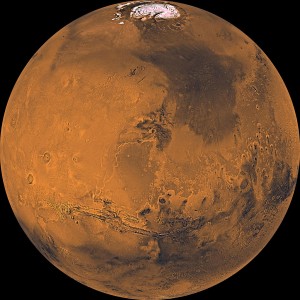New study finds that macroweather exists on Mars

A global mosaic of Mars from the Viking mission. The new study used information collected from this Mars lander mission which occurred during the 1970s and 1980s. Credit: NASA/JPL
Weather, which changes day-to-day due to constant fluctuations in the atmosphere, and climate, which varies over decades, are familiar to those of us here on Earth. More recently, a third regime, called “macroweather,” has been used to describe the relatively stable period between short-term weather and long-term climate.
A new study finds that this same three-part pattern applies to atmospheric conditions on Mars. The results, published today in Geophysical Research Letters, a journal of the American Geophysical Union, also show that the sun plays a major role in determining macroweather.
The research promises to advance scientists’ understanding of the dynamics of Earth’s own atmosphere – and could provide insights into the weather of Venus, Saturn’s moon Titan, and possibly the gas giants Jupiter, Saturn, Uranus and Neptune.
The scientists chose to study Mars for its wealth of data with which to test their theory that a transitional “macroweather” regime exists on other planets. They used information collected from Viking—a Mars lander mission during the 1970s and 1980s—and more recent data from a satellite orbiting Mars.
By taking into account how the sun heats Mars, as well as the thickness of the planet’s atmosphere, the scientists predicted that Martian temperature and wind would fluctuate similarly to Earth’s – but that the transition from weather to macroweather would take place over 1.8 Martian days (about two Earth days), compared with a week to 10 days on Earth.
“Our analysis of the data from Mars confirmed this prediction quite accurately,” said Shaun Lovejoy, a physics professor at McGill University in Montreal, Canada, and lead author of the paper. “This adds to evidence, from studies of Earth’s atmosphere and oceans, that the sun plays a central role in shaping the transition from short-term weather fluctuations to macroweather.”
The findings also indicate that weather on Mars can be predicted with some skill only two days in advance, compared to 10 days on Earth.
Co-author Professor Jan-Peter Muller from the University College London Mullard Space Science Laboratory in the United Kingdom, said: “We’re going to have a very hard time predicting the weather on Mars beyond two days given what we have found in weather records there, which could prove tricky for the European lander and rover.”
The American Geophysical Union is dedicated to advancing the Earth and space sciences for the benefit of humanity through its scholarly publications, conferences, and outreach programs. AGU is a not-for-profit, professional, scientific organization representing more than 62,000 members in 144 countries. Join our conversation on Facebook, Twitter, YouTube, and other social media channels.
Notes for Journalists
Journalists and public information officers (PIOs) of educational and scientific institutions who have registered with AGU can download a PDF copy of this article by clicking on this link: http://onlinelibrary.wiley.com/doi/10.1002/2014GL061861/abstract?campaign=wlytk-41855.5282060185
Or, you may order a copy of the final paper by emailing your request to Kate Wheeling at kwheeling@agu.org. Please provide your name, the name of your publication, and your phone number.
Neither the paper nor this press release is under embargo.
Title
“On Mars too, expect macroweather”
Authors:
Shaun Lovejoy: McGill University, Montreal, Quebec, Canada;
J.P. Muller: Mullard Space Science Laboratory, Surrey, UK;
J.P. Boisvert: McGill University, Montreal, Quebec, Canada
Contact information for the authors:
Shaun Lovejoy: lovejoy@physics.mcgill.ca
AGU Contact:
Kate Wheeling
+1 (202) 777-7516
kwheeling@agu.org
McGill Contact:
Chris Chipello
+1 (514) 398-4201
christopher.chipello@mcgill.ca
UCL Contact:
Rebecca Caygill
+44 (0)20 3108 3846
r.caygill@ucl.ac.uk
Media Contact
All latest news from the category: Earth Sciences
Earth Sciences (also referred to as Geosciences), which deals with basic issues surrounding our planet, plays a vital role in the area of energy and raw materials supply.
Earth Sciences comprises subjects such as geology, geography, geological informatics, paleontology, mineralogy, petrography, crystallography, geophysics, geodesy, glaciology, cartography, photogrammetry, meteorology and seismology, early-warning systems, earthquake research and polar research.
Newest articles

First-of-its-kind study uses remote sensing to monitor plastic debris in rivers and lakes
Remote sensing creates a cost-effective solution to monitoring plastic pollution. A first-of-its-kind study from researchers at the University of Minnesota Twin Cities shows how remote sensing can help monitor and…

Laser-based artificial neuron mimics nerve cell functions at lightning speed
With a processing speed a billion times faster than nature, chip-based laser neuron could help advance AI tasks such as pattern recognition and sequence prediction. Researchers have developed a laser-based…

Optimising the processing of plastic waste
Just one look in the yellow bin reveals a colourful jumble of different types of plastic. However, the purer and more uniform plastic waste is, the easier it is to…



